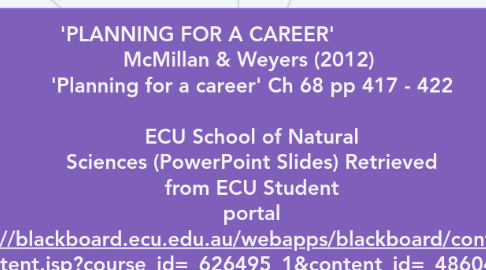'PLANNING FOR A CAREER' McMillan & Weyers (2012) 'Planning for a career' Ch 68 pp 417 - 422 ECU School of Natural Sciences (PowerPoint Slides) Retrieved from ECU Student portal https://blackboard.ecu.edu.au/webapps/blackboard/content/list Content.jsp?course_id=_626495_1&content_id=_4860440_1
создатель Amy Gaunt


1. What is achievable?
1.1. What can you achieve comfortably?
1.1.1. Look within own realistic limits
1.2. What suits you best?
1.2.1. Consider personal life, location, the work load you can handle
1.3. Have a strong and practical focus
2. Look ahead of time
2.1. Research future possible jobs
2.2. Ask around and contact direct sources
2.3. Direct current choices towards your goal (set an action plan)
2.3.1. Are your study choices relevant to your goals?
2.4. Have options to fall back on, stay open minded
3. Employability
3.1. Personal qualities
3.1.1. Be aware of your strengths
3.1.2. Use them to your full ability
3.2. Subject knowledge
3.2.1. Consider how specific it might need to be
4. How to plan?
4.1. Start to plan early
4.1.1. Think long term
4.2. Be specific in aim and choice
4.3. What suits you best personally?
4.3.1. Where do you want your career and personal life to be in 10-15 years
4.4. Narrow down your options to get a clear path
5. Set personal long term goals
5.1. What do you wish to achieve out of this?
5.1.1. Apirations
5.2. Think what is possible for you
5.2.1. Consider personal life situation and how you want your career and life to work together
5.3. Consider finances, personal life, location, family, mental health
6. Be proactive
6.1. Take personality tests
6.1.1. www.careerplanner.com
6.1.2. www.bbc.co.uk/science/humanbody/mind/surveys/careers/index.shtml
6.2. Contact future possible employers
6.2.1. Make a phone call
6.2.2. Send an email
6.2.3. Ask what they look for in employees
